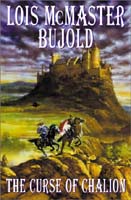The Curse of Chalion

Bujold, Lois McMaster. The Curse of Chalion. New York: EOS/HarperCollins, 2001. ISBN 0-380-81983-X, hc, $25.00.

(These two reviews originally appeared in Mythprint 38:3 (#228) in March 2001.)
Reviewed by Pauline Alama
Lois McMaster Bujold’s epic fantasy The Curse of Chalion begins as a courtly intrigue but develops into a true mythopoeic fantasy, exploring the nature of miracles and the relationship between the human and the divine.
Having somehow managed to avoid reading any of Bujold’s other acclaimed books (an omission I plan to rectify), I came to this work fresh, not burdened by the expectation of another installment of the Vorkosigan Saga that seems to have kept some of her loyal fans from appreciating this departure into fantasy and her detractors from giving this book a try.
Cazaril, a man raised in privilege but shaped by tragedy into a wiser, more compassionate, less hopeful man, is the protagonist and the heart of this novel. After suffering inhuman horrors as a prisoner of war and galley slave, the former courtier returns to a court he served in his boyhood, broken in body and tested in spirit, unable to fit into the world where he once belonged. Half out of pity, he is entrusted with a position as tutor to an intelligent and spirited young princess — a safe job for a broken man, his benefactors mistakenly believe.
In trying to do his daily duties — a recurring theme of the novel — of protecting and educating the princess, Cazaril becomes involved in trying to free her from the curse that has afflicted the land of Chalion and its royal house since her grandfather’s time — and takes upon himself every kind of danger, political, physical, and supernatural.
The first thing that struck me about The Curse of Chalion was its readability: Bujold keeps the twists and turns of the plot coming at a good pace, quick but not dizzying. I had time to digest each new turn of affairs, but just enough time; as soon as I thought I knew which way the plot was headed, the next twist would send me spinning. Next, I was impressed by the lively characters Bujold has created, especially her protagonist, Cazaril. I also admire Bujold’s deft setup of the political intrigue within Chalion and in its relations with its chronically warring neighbors. Halfway through the novel, I was settled in my expectation of a clever political intrigue with a touch of romance, set in a fantastical world but with few glimpses of the deeper world of the “mythopoeic” fantasy.
Then the gods entered the picture, and I discovered what the novel was really about:
“[H]ave you really understood how powerless the gods are, when the lowest slave may exclude them from his heart? And if from his heart, then from the world as well…. If the gods could seize passage from anyone they wished, then men would be mere puppets. Only if they borrow or are given will from a willing creature do they have a little channel through which to act… [S]ometimes a man may open himself to them, and let them pour through him into the world.”
The often painful process of making room for the gods in the world is the key to the working out of the novel’s complex, well-crafted plot and central to its moral and spiritual force — which is considerable, in my opinion. Although the theological ideas of The Curse of Chalion are presented in terms of an invented religion of five gods, they are certainly applicable to Christianity, and perhaps to any religion. How many of us, of any religious persuasion, could put aside our own ambitions long enough to allow God (or the gods) to work through us? If we won’t do this, do we have any right to cry out to God(s) for help in times of trouble?
By addressing these thorny theological questions in an engaging work of epic fantasy, Bujold well earned the distinction of a Mythopoeic Fantasy Award for 2002.
I would offer this story as a rebuttal to any who believe fantasy is only escapism. The Curse of Chalion shows what fantasy can do in the right hands: it can explore the deepest truths of the human heart. I recommend it to anyone looking for fantasy worth taking seriously.
Reviewed by Deirdre McCarthy
A fascinating story of court intrigue and magic unfolds in this new novel by Lois McMasters Bujold. A wrecked ex-soldier makes his way to the castle of the the noble family he served in his youth, hoping to find peace and anonymity. Instead he is thrown into the highest councils in the land, eventually finding himself to be the focal point of both worldly and other-worldly power struggles. This soldier is named Cazaril, and he is weary and destitute, but still retains his wit.
The world is a fantasy one but it is carefully crafted to hold enough familiar elements that one doesn’t feel lost, and yet new and fresh enough that one eagerly flips the pages to continue filling out both the environment and the story transpiring therein. The characters, too, grow like real people, and have real dimension and substance. Cazaril is strong and noble and admirable, but we know from his inner voice that he is also insecure, bitter at times, and lonely, and we see very tenderly how he battles his inner demons.
But this book is not entirely in Cazaril’s head, and there is fighting and pageantry aplenty.